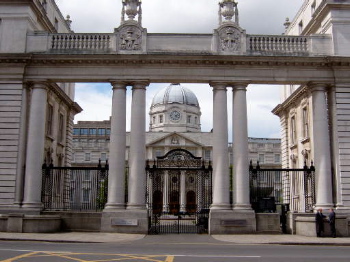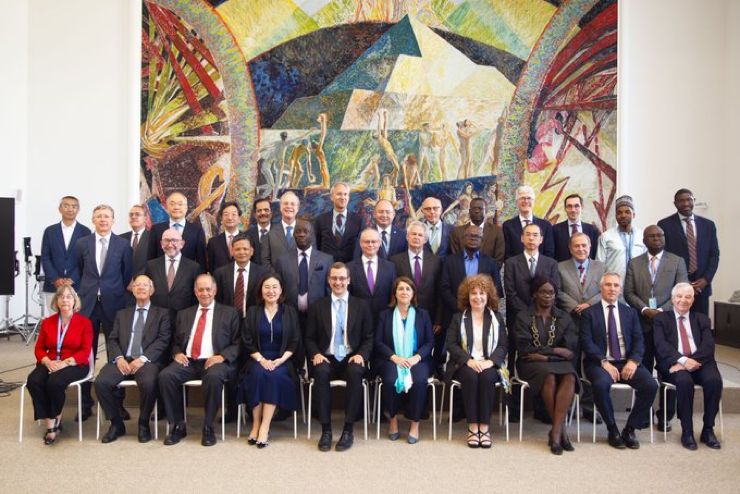|
Mahon Hayes
Francis Mahon Hayes (2 March 1930 – 26 June 2011) was an Irish lawyer and ambassador. Early life He was educated in University College Dublin and King's Inns. Called to the bar in 1952, he practiced for a time before going to work at the Land Registry, moving later to the Department of Justice and then to the Department of External Affairs as it was then called. Career in foreign affairs As assistant legal adviser in the department, he provided legal advice on the Free Trade Agreement with Britain signed in 1965. He was appointed legal adviser to the department in 1970. Together with the Attorney General's office, he was chief legal advisor on Ireland's entry to the European Economic Community in 1973. During the Northern Ireland troubles he was involved in the case taken by Ireland against Britain before the European Court of Human Rights on ill-treatment of detainees. He is best remembered for his role in matters relating to the United Nations Convention on the Law of t ... [...More Info...] [...Related Items...] OR: [Wikipedia] [Google] [Baidu] |
University College Dublin
University College Dublin (), commonly referred to as UCD, is a public research university in Dublin, Ireland, and a collegiate university, member institution of the National University of Ireland. With 38,417 students, it is Ireland's largest university. UCD originates in a body founded in 1854, which opened as the Catholic University of Ireland on the feast of Saint Malachy, St. Malachy with John Henry Newman as its first rector; it re-formed in 1880 and chartered in its own right in 1908. The Universities Act, 1997 renamed the constituent university as the "National University of Ireland, Dublin", and a ministerial order of 1998 renamed the institution as "University College Dublin – National University of Ireland, Dublin". Originally located at St Stephen's Green and National Concert Hall, Earlsfort terrace in Dublin's city centre, all faculties later relocated to a campus at Belfield, Dublin, Belfield, six kilometres to the south of the city centre. In 1991, it purchas ... [...More Info...] [...Related Items...] OR: [Wikipedia] [Google] [Baidu] |
King's Inns
The Honorable Society of King's Inns () is the "Inn of Court" for the Bar of Ireland. Established in 1541, King's Inns is Ireland's oldest school of law and one of Ireland's significant historical environments. The Benchers of King's Inns award the degree of barrister-at-law necessary to qualify as a barrister and be called to the bar in Ireland. As well as training future and qualified barristers, the school extends its reach to a diverse community of people from legal and non-legal backgrounds offering a range of accessible part-time courses in specialist areas of the law. History The King's Inns society was granted a royal charter by King Henry VIII in 1541, 51 years before Trinity College Dublin was founded, making it one of the oldest professional and educational institutions in the English-speaking world. The founders named their society in honour of King Henry VIII of England and his newly established Kingdom of Ireland. Initially, the society was housed in a disused ... [...More Info...] [...Related Items...] OR: [Wikipedia] [Google] [Baidu] |
European Economic Community
The European Economic Community (EEC) was a regional organisation created by the Treaty of Rome of 1957,Today the largely rewritten treaty continues in force as the ''Treaty on the functioning of the European Union'', as renamed by the Lisbon Treaty. aiming to foster economic integration among its member states. It was subsequently renamed the European Community (EC) upon becoming integrated into the Three pillars of the European Union, first pillar of the newly formed European Union (EU) in 1993. In the popular language, the singular ''European Community'' was sometimes inaccurately used in the wider sense of the plural ''European Communities'', in spite of the latter designation covering all the three constituent entities of the first pillar. The EEC was also known as the European Common Market (ECM) in the English-speaking countries, and sometimes referred to as the European Community even before it was officially renamed as such in 1993. In 2009, the EC formally ceased to ... [...More Info...] [...Related Items...] OR: [Wikipedia] [Google] [Baidu] |
European Court Of Human Rights
The European Court of Human Rights (ECtHR), also known as the Strasbourg Court, is an international court of the Council of Europe which interprets the European Convention on Human Rights (ECHR). The court hears applications alleging that a contracting state has breached one or more of the human rights enumerated in the convention or its optional protocols to which a member state is a party. The court is based in Strasbourg, France. The court was established in 1959 and decided its first case in 1960 in ''Lawless v. Ireland''. An application can be lodged by an individual, a group of individuals, or one or more of the other contracting states. Aside from judgments, the court can also issue advisory opinions. The convention was adopted within the context of the Council of Europe, and all of its member states of the Council of Europe, 46 member states are contracting parties to the convention. The court's primary means of judicial interpretation is the living instrument doctrine, ... [...More Info...] [...Related Items...] OR: [Wikipedia] [Google] [Baidu] |
United Nations Convention On The Law Of The Sea
The United Nations Convention on the Law of the Sea (UNCLOS), also called the Law of the Sea Convention or the Law of the Sea Treaty, is an international treaty that establishes a legal framework for all marine and maritime activities. , 169 sovereign states and the European Union are parties, including all major powers except the United States. The convention resulted from the third United Nations Conference on the Law of the Sea (UNCLOS III), which took place between 1973 and 1982. UNCLOS replaced the four treaties of the 1958 Convention on the High Seas. UNCLOS came into force in 1994, a year after Guyana became the 60th nation to ratify the treaty. In 2023, agreement was reached on a High Seas Treaty to be added as an instrument of the convention, to protect ocean life in international waters. This would provide measures including Marine Protected Areas and environmental impact assessments. While the secretary-general of the United Nations receives instruments of rati ... [...More Info...] [...Related Items...] OR: [Wikipedia] [Google] [Baidu] |
International Law Commission
The International Law Commission (ILC) is a body of experts responsible for helping develop and codify international law. It is composed of 34 individuals recognized for their expertise and qualifications in international law, who are elected by the United Nations General Assembly (UNGA) every five years. The ideological roots of the ILC originated as early as the 19th century when the Congress of Vienna in Europe developed several international rules and principles to regulate conduct among its members. Following several attempts to develop and rationalize international law in the early 20th century, the ILC was formed in 1947 by the UNGA pursuant to the Charter of the United Nations, which calls on the Assembly to help develop and systematize international law. The Commission held its first session in 1949, with its initial work influenced by the Second World War and subsequent concerns about international crimes such as genocide and acts of aggression. The ILC has since held an ... [...More Info...] [...Related Items...] OR: [Wikipedia] [Google] [Baidu] |
1930 Births
Events January * January 15 – The Moon moves into its nearest point to Earth, called perigee, at the same time as its fullest phase of the Lunar Cycle. This is the closest moon distance at in recent history, and the next one will be on January 1, 2257, at . * January 26 – The Indian National Congress declares this date as Independence Day, or as the day for Purna Swaraj (Complete Independence). * January 28 – The first patent for a field-effect transistor is granted in the United States, to Julius Edgar Lilienfeld. * January 30 – Pavel Molchanov launches a radiosonde from Pavlovsk, Saint Petersburg, Slutsk in the Soviet Union. February * February 10 – The Việt Nam Quốc Dân Đảng launch the Yên Bái mutiny in the hope of ending French Indochina, French colonial rule in Vietnam. * February 18 – While studying photographs taken in January, Clyde Tombaugh confirms the existence of Pluto, a celestial body considered a planet until redefined as a dwarf planet ... [...More Info...] [...Related Items...] OR: [Wikipedia] [Google] [Baidu] |
2011 Deaths
This is a list of lists of deaths of notable people, organized by year. New deaths articles are added to their respective month (e.g., Deaths in ) and then linked below. 2025 2024 2023 2022 2021 2020 2019 2018 2017 2016 2015 2014 2013 2012 2011 2010 2009 2008 2007 2006 2005 2004 2003 2002 2001 2000 1999 1998 1997 1996 1995 1994 1993 1992 1991 1990 1989 1988 1987 1986 Earlier years ''Deaths in years earlier than this can usually be found in the main articles of the years.'' See also * Lists of deaths by day * Deaths by year (category) {{DEFAULTSORT:deaths by year ... [...More Info...] [...Related Items...] OR: [Wikipedia] [Google] [Baidu] |
Alumni Of University College Dublin
Alumni (: alumnus () or alumna ()) are former students or graduates of a school, college, or university. The feminine plural alumnae is sometimes used for groups of women, and alums (: alum) or alumns (: alumn) as gender-neutral alternatives. The word comes from Latin, meaning nurslings, pupils or foster children, derived from "to nourish". The term is not synonymous with "graduates": people can be alumni without graduating, e.g. Burt Reynolds was an alumnus of Florida State University but did not graduate. The term is sometimes used to refer to former employees, former members of an organization, former contributors, or former inmates. Etymology The Latin noun means "foster son" or "pupil". It is derived from the Latin verb "to nourish". Separate, but from the same root, is the adjective "nourishing", found in the phrase '' alma mater'', a title for a person's home university. Usage in Roman law In Latin, is a legal term (Roman law) to describe a child placed in foster ... [...More Info...] [...Related Items...] OR: [Wikipedia] [Google] [Baidu] |






